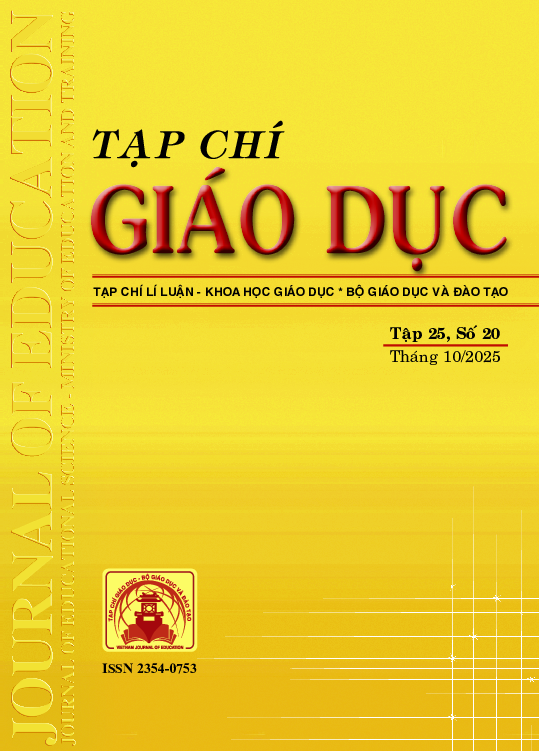Đánh giá chất lượng phản hồi của các bên liên quan trong phát triển chương trình dạy học ở các cơ sở giáo dục và đào tạo nhóm ngành sức khỏe tại Việt Nam
Tóm tắt
In the context of competency-based higher education increasingly emphasizing the importance of stakeholder feedback to improve training programs, this study was conducted to evaluate the quality of feedback from four groups: lecturers, learners, former learners, and employers involved in developing teaching programs at six educational institutions with a history of health-related training. The results indicated that feedback from lecturers was rated highest in completeness, timeliness, and reliability. Feedback from learners and former learners was valuable but limited in relevance and accessibility. Meanwhile, feedback from employers scored the lowest, especially in accessibility. Based on these findings, the study proposed establishing a two-way, stable, and transparent feedback system between the school and stakeholders; standardizing survey tools appropriate for each group; and enhancing the roles of lecturers and employers in the program improvement process. The findings provide a practical foundation for designing internal quality assurance policies suited to the context of competency-based higher education in Vietnam.
Tài liệu tham khảo
Aghgashyan, R., Margarov, G., Rapp, C., & Mitrofanova, E. (2014). The role of stakeholders in the process of study program Improvement. In International Conference “Education in the 21st century: Problems and Challenges” (pp. 31-33). Iran: Teheran.
Beerkens, M., & Udam, M. (2017). Stakeholders in higher education quality assurance: Richness in diversity? Higher Education Policy, 30, 341-359.
Bộ GD-ĐT (2025). Thông tư số 04/2025/TT-BGDĐT ngày 17/02/2025 quy định về kiểm định chất lượng chương trình đào tạo các trình độ của giáo dục đại học.
Bryson, J. M. (2004). What to do when Stakeholders matter. Public Management Review, 6(1), 21-53. https://doi.org/10.1080/14719030410001675722
Chandler, D., & Werther, W. B., Jr. (2014). Strategic corporate social responsibility: Stakeholders, globalization and sustainable value creation. Thousand Oaks: SAGE Publications Inc.
Duffy, B., Smith, K., Terhanian, G., & Bremer, J. (2005). Comparing data from online and face-to-face surveys. International Journal of Market Research, 47(6), 615-639.
Freeman, R. E. (1984). Strategic management: A stakeholder approach. Pitman.
Langrafe, T. D. F., Barakat, S. R., Stocker, F., & Boaventura, J. M. G. (2020). A stakeholder theory approach to creating value in higher education institutions. The Bottom Line, 33(4), 297-313.
Prideaux, D. (2003). ABC of learning and teaching in medicine: Curriculum design. BMJ, 326(7383), 268-270.
Ramani, S., Könings, K. D., Ginsburg, S., & van der Vleuten, C. P. M. (2019). Feedback redefined: Principles and practice. Journal of General Internal Medicine, 34(5), 744-749. https://doi.org/10.1007/s11606-019-04874-2
Ramaprasad, A. (1983). On the definition of feedback. Behavioral Science, 28(1), 4-13.
Schiller, C., Winters, M., Hanson, H. M., & Ashe, M. C. (2013). A framework for stakeholder identification in concept mapping and health research: a novel process and its application to older adult mobility and the built environment. BMC Public Health, 13(1). https://doi.org/10.1186/1471-2458-13-428
Turan, F. K., Cetinkaya, S., & Ustun, C. (2016). A methodological framework to analyze stakeholder preferences and propose strategic pathways for a sustainable university. Higher Education, 72, 743-760.
Thistlethwaite, J. E., Forman, D., Matthews, L. R., Rogers, G. D., Steketee, C., & Yassine, T. (2014). Competencies and frameworks in interprofessional education. Academic Medicine, 89(6), 869-875.
Thomas, P. A., Kern, D. E., Hughes, M. T., & Chen, B. Y. (2022). Curriculum development for medical education: A six-step approach (3rd Ed.). Johns Hopkins University Press.
Veloski, J., Boex, J. R., Grasberger, M. J., Evans, A., & Wolfson, D. B. (2006). Systematic review of the literature on assessment, feedback and physicians’ clinical performance: BEME Guide No. 7. Medical Teacher, 28(2), 117-128. https://doi.org/10.1080/01421590600622665
Watling, C., Driessen, E., Van der Vleuten, C. P. M., Vanstone, M., & Lingard, L. (2012). Understanding responses to feedback: The potential and limitations of regulatory focus theory. Medical Education, 46(6), 593-603.
Tải xuống
Đã Xuất bản
Cách trích dẫn
Số
Chuyên mục
Giấy phép

Tác phẩm này được cấp phép theo Ghi nhận tác giả của Creative Commons Giấy phép quốc tế 4.0 .












